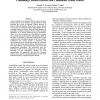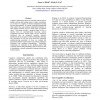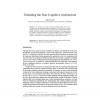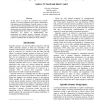139
Voted
AAAI
2011
14 years 2 months ago
2011
Action modeling is an important skill for agents that must perform tasks in novel domains. Previous work on action modeling has focused on learning STRIPS operators in discrete, r...
120
click to vote
TSMC
2010
14 years 8 months ago
2010
We describe a cognitive architecture for creating more robust intelligent systems by executing hybrids of algorithms based on different computational formalisms. The architecture ...
152
click to vote
COGSR
2011
14 years 9 months ago
2011
Cognitive architectures need to resolve the diversity dilemma – i.e., to blend diversity and simplicity – in order to couple functionality and efficiency with integrability, e...
150
click to vote
BICA
2010
14 years 9 months ago
2010
Graphical cognitive architectures implement their functionality through localized message passing among computationally limited nodes. First-order variables
124
click to vote
HCI
2009
14 years 12 months ago
2009
The evaluation and design of user interfaces may be facilitated by using performance models based on cognitive architectures. A recent trend in HCI is the increased focus on percep...
138
click to vote
JETAI
2007
15 years 2 months ago
2007
Research in computational cognitive modeling investigates the nature of cognition through developing process-based understanding by specifying computational models of mechanisms (...
117
click to vote
EXPERT
2007
15 years 2 months ago
2007
Agent-based social simulation (with multi-agent systems), which is an important aspect of social computing, can benefit from incorporating cognitive architectures, as they provid...
116
click to vote
IJCAI
1989
15 years 3 months ago
1989
Cognitive architectures aspire for generality both in terms of problem solving and learning across a range of problems, yet to date few examples of domain independent learning has...
111
click to vote
AGI
2008
15 years 3 months ago
2008
One approach in pursuit of general intelligent agents has been to concentrate on the underlying cognitive architecture, of which Soar is a prime example. In the past, Soar has reli...
145
click to vote
AAAI
2007
15 years 4 months ago
2007
In this paper, we explore the hypothesis that episodic memory is a critical component for cognitive architectures that support general intelligence. Episodic memory overlaps with ...





